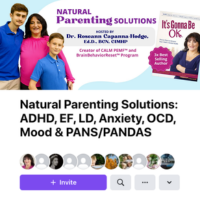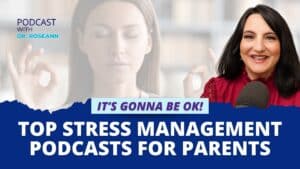7 Best Vitamins and Supplements for Anxiety
Stress and anxiety are a common condition affecting both children and adults. Anxiety disorders affect 40 million adults in the United States age 18 and older, or 18.1% of the population every year, making them one of the most common mental illnesses. About three percent of children in the US have an Anxiety Disorder with the average age of onset being age six.
There has been a cultural shift toward adopting a high-stress lifestyle, along with poor dietary habits, reduced sleep, health issues, and increased genetic mutations are all contributing factors. Evidence suggests from the national center for complementary and integrative health that supplements can reduce stress and anxiety.
People with anxiety are searching for natural remedies that calm their brain and body such as herbs and supplements. They are looking how to calm anxiety naturally and without the side effects that prescription medications and anti-anxiety medication have and thankfully there are many science-backed natural healing remedies that calm the brain. These seven vitamins and supplements for anxiety have research to support their efficacy and should be considered to reduce symptoms and lead to improved anxiety.
What Vitamins Help With Anxiety?
There any many medically reviewed dietary supplements, vitamins, nutrients, and herbal supplements that provide natural anxiety support. In a time with stress at an all-time high, using high quality holistic remedies for anxiety from your healthcare professional can help you or your child get stress and anxiety relief.
Magnesium
One of the most popular natural anxiety remedies, Magnesium supplements, is a cofactor in more than 300 enzyme systems that regulate many biochemical and enzymatic reactions within the body. These include many important functions, such as metabolizing food, synthesizing fatty acids and proteins, transmitting nerve impulses for better muscle and blood glucose control, and regulating blood pressure.
Magnesium supports how the Central Nervous System (CNS) manages stress. Magnesium is needed for energy production (mitochondrial function) and the glucose breakdown for energy and cerebral energy metabolism, which is associated with anxiety and social behavior.
Magnesium binds with ATP, the main source of energy for the cells, regulates transmembrane transport, and plays a variety of roles in function and structure of proteins, nucleic acid, and mitochondria . It also is required for the synthesis of DNA, RNA, and the antioxidant glutathione, which is a powerful antioxidant that supports detoxification and a healthy immune system. Oxidative stress and improper detoxification are associated with increased levels of anxiety.
The majority of Western populations consume less than the recommended amount of magnesium. A systematic review of the literature, shows that many studies (Al Alawi, A. M., Majoni, S. W., & Falhammar, H., 2018) have reported that reduced levels of magnesium are associated with a wide range of chronic diseases including, among others, anxiety. As one of the primary vitamins for immune system and anxiety, research supports the efficacy of Magnesium. It plays an important role in the HPA Axis to help manage the body's stress response system
Ingested Magnesium is absorbed through the gut and how well it is absorbed varies depending on a number of factors, including gut health. Aside from eating Magnesium dense foods like avocados, legumes, or nuts, it can be directly taken in capsule or powder form. Magnesium is considered one of the safest supplements for stress regulation and should be taken to bowel tolerance.
L-Theanine
L-Theanine is an amino acid found in green tea. It has a calming and relaxing effect on the brain and is used in several Asian countries as one of the natural remedies for anxiety and depression. L-Theanine supports the brain in several ways, supporting both neurotransmitter functioning and brainwave activity. L-theanine modulates aspects of brain function in humans by increasing Alpha brainwave activity, which calms the brain.
L-theanine increases brain levels of serotonin, dopamine and GABA (an important inhibitory neurotransmitter). By increasing GABA without producing sleepiness or motor impairment, L-theanine produces its anti-anxiety effects. L-theanine reduces anxiety by blocking the excitatory neurotransmitter of glutamate. By inhibiting the overstimulating glutamate, the brain learns to relax and one feels more at ease.
Studies have shown that when taken as a supplement, L-Theanine can help to reduce the effects of stress on the brain and body, and the resulting toxic excitatory neurotransmitter activity, which can result in cognitive decline. Chronic stress states have also been found to be associated with anxiety, depression, and neurodegenerative disorders. It can be taken in capsule or powder form and no negative side effects have been found in research.
GABA
Gamma-Amino Butyric acid (GABA) is a neurotransmitter that inhibits nerve transmission in the brain, calming nervous activity. The neurotransmitter GABA blocks the excitatory neurotransmitter glutamate, keeping nerve cells from firing too often and too easily. People who are low in GABA are prone to neurological issues of over-excitability, such as agitation, irritability, and anxiety.
In fact, low GABA activity in the brain's emotional center, amygdala. is associated with the development of panic attacks and anxiety disorder, making it one of the more effective natural remedies for both issues. Healthy GABA activity in the brain is important in regulating anxiety-related behavior.
GABA is widely available and has been used since at least the 1950's as an aide to reduce stress and anxiety. While there have been some questions about how GABA is absorbed, a number of studies have reported that GABA does cross the Blood-Brain Barrier, in small amounts. The use of GABA has been shown to support anxiety, depression, sleep problems, autism, panic attacks, and agitation. It can be directly taken in capsule or powder form.
Essential Fatty Acid (EPA)
Omega 3 is the name given to a group of polyunsaturated fatty acids, of which, Docosahexaenoic acid (DHA) and Eicosapentaenoic acid (EPA) are essential for brain health. After eating, omega-3 fatty acids are incorporated into body tissue cell membranes and have powerful anti-inflammatory functions within the body.
Research supports that at the cellular level, omega-3 fatty acids from fish oils can affect a number of cellular activities associated with inflammation. Inflammation is associated with a number of mental health conditions, including anxiety, autism, depression, concussion, OCD, PANS/PANDAS, etc. and reducing it has been shown to improve mental health.
An omega-3 supplement is “essential” because it is not made in the body and must come from eating Omega rich foods such as salmon, tuna, sardines, wild game, and walnuts or as a dietary supplement.
The other essential fatty acid is omega-6, which can be found in corn, eggs, poultry, and soybean oil. Omega-6 contains gamma-linolenic acid (GLA), which has powerful anti-inflammatory properties.
The omega-3 fatty acids EPA and DHA are critical for normal brain function and development and for brain flexibility. Omega-3 can affect how the neurotransmitter serotonin works. Largely manufactured in the gut, serotonin plays a critical role in both depression and anxiety.
Perhaps one of the best vitamins for anxiety and stress, omega-3 helps with prefrontal cortex and the nucleus accumbens functioning, the brain regions involved in motivation, behavior, and emotional regulation, which is why it helps people with attention problems. DHA is a critical structural component of the cerebral cortex, which is the area of the brain responsible for language, memory, generalizing, creativity, judgment, emotion, and attention, which are all skills kids need for academic success.
Omega-3 is an essential fatty acid with research has noted positive effects on a number of mental health and brain conditions, including anxiety, depression, ADHD, and panic disorder.
Vitamin D
Vitamin D₃ is made in your skin through a chemical process called “photolysis” that occurs when you expose your skin to ultraviolet B rays. In the liver, vitamin D is turned into a chemical called calcidiol and this vitamin D prohormone travels through the bloodstream to the kidneys, where it's turned into the active form.
Every tissue in the body has vitamin D receptors, including the brain, heart, muscles, endocrine system, and immune system, which means vitamin D is needed at every level for the body to function. Since vitamin D is involved in so many functions in the brain and body, it has an important role in supporting anxiety.
Upwards of 70% of Americans are vitamin D deficient leading to significant medical and psychological consequences. Low levels of vitamin D are associated with anxiety and depression. In terms of anxiety and mood, if the brain and endocrine system are not getting enough vitamin D, then they can't work properly then these symptoms can result. Vitamin D plays a role in magnesium homeostasis, which is necessary for so many biochemicals in the body and calming the brain.
If you have a mental health issue, it is important to have your vitamin D levels checked, as low levels are associated with a stressed brain and body. For those with clinical conditions, your blood levels of vitamin D should be on the high end of average.
Vitamin B
The B vitamins are important nutrients in managing stress and anxiety. They are necessary for maintaining healthy nervous and digestive systems and other metabolic functions, as well as play a key role in brain health. The B vitamins reduce fatigue and boost mood and improve symptoms of anxiety.
B vitamins come from food sources, such as, whole grains, rice, meat, eggs, dark leafy vegetables, fruit, and legumes and can also be taken via a supplement. The body does not store B vitamins well, so supplementation and eating foods rich in vitamin B are helpful because they are especially needed in times of increased by stress and illness.
There are several types of B vitamins, and each one supports the brain and body in different ways. All B vitamins support how the nervous system functions and that has a direct implication for those with anxiety. For example, B-6 – Pyridoxine helps the body manufacture neurotransmitters, such as serotonin, which aids in the body's ability to cope with depression, stress, and anxiety.
The B vitamins include (B1) Thiamine,(B2) Riboflavin, (B3) Niacin, (B5) Pantothenate, (B6) Pyridoxine, (B9) Folate, and (B12) Cobalamin. Many individuals take a B complex that contains all of the B vitamins.
A common mutation called methylenetetrahydrofolate reductase (MTHFR) impacts how folate is used in the body and brain. It effects upwards of 40 percent of the US population, as well as is implicated in a variety of physical and mental health conditions, including, anxiety, depression, autism, ADHD, chronic disease, etc. This gene mutation can lead to high levels of homocysteine in the blood and low levels of folate and other vitamins. There are two MTHFR mutations – C677T and A1298C and a person can have one or both and they impact the bioavailability of folate. Folate (B-9) is important in the detoxification process and necessary for the nervous system to function well. When brain dysregulation occurs, conditions such as anxiety and depression can result.
Ashwagandha
Ashwagandha is a natural adaptogen herb used to promote overall wellness. From India, it has been used for centuries to manage stress and anxiety by balancing the body's physiological systems, which are out of balance when anxiety is present.
Ashwagandha works by supporting the GABAergic communication system, which can be faulty in those with anxiety.
It contains several naturally-occurring phytochemicals that help to regulate the hormone system which play a key role in how our body manages stress. Ashwagandha can help to lower stress and anxiety levels by supporting normal HPA Axis function and lowering cortisol levels and blood glucose levels. Cortisol is known as a stress hormone because the adrenal glands release it in response to stress, as well as when your blood sugar levels get too low and high levels of cortisol is associated with stress and anxiety.
Ashwagandha boosts the adrenal glands by supporting normal HPA Axis function, which helps the hypothalamic, pituitary, and adrenal glands communicate, which is critical in the body's and brain's ability to manage stress. Ashwagandha also lowers inflammation, which has been shown to be associated with anxiety.
Complementary and alternative medicine (CAM) is becoming more accepted as a long-term treatment measure for mental health issues. Natural remedies for anxiety, such as vitamins for anxiety and stress, are a growing trend in the treatment of stress-related disorders. Talk to your medical provider if you have additional questions about CAM treatment for anxiety.
Download my supplement checklist for research recommended dosages for these supplements for kids.
Always remember… “Calm Brain, Happy Family™”
Disclaimer: This article is not intended to give health advice and it is recommended to consult with a physician before beginning any new wellness regime. *The effectiveness of diagnosis and treatment vary by patient and condition. Dr. Roseann Capanna-Hodge, LLC does not guarantee certain results.
Are you looking for SOLUTIONS for your struggling child or teen?
Dr. Roseann and her team are all about solutions, so you are in the right place!
There are 3 ways to work with Dr. Roseann:
- In-person at her Ridgefield, CT center
- Virtually with her at home neurofeedback and coaching programs
- By joining my Natural Parenting Solutions for ADHD, EF, LD, Anxiety, OCD, Mood & PANS/PANDAS
You can get her books for parents and professionals, including: It's Gonna Be OK™: Proven Ways to Improve Your Child's Mental Health, Teletherapy Toolkit™ and Brain Under Attack: A Resource For Parents and Caregivers of Children With PANS, PANDAS, and Autoimmune Encephalopathy.
If you are a business or organization that needs proactive guidance to support employee mental health or an organization looking for a brand representative, check out Dr. Roseann's professional speaking page to see how we can work together.
Dr. Roseann is a Children's Mental Health Expert and Therapist who has been featured in/on hundreds of media outlets including, CBS, NBC, FOX News, PIX11 NYC, The New York Times, The Washington Post,, Business Insider, USA Today, CNET, Marth Stewart, and PARENTS. FORBES called her, “A thought leader in children's mental health.”
She is the founder and director of The Global Institute of Children's Mental Health and Dr. Roseann Capanna-Hodge. Dr. Roseann is a Board Certified Neurofeedback (BCN) Practitioner, a Board Member of the Northeast Region Biofeedback Society (NRBS), Certified Integrative Mental Health Professional (CIMHP) and an Amen Clinic Certified Brain Health Coach. She is also a member of The International Lyme Disease and Associated Disease Society (ILADS), The American Psychological Association (APA), Anxiety and Depression Association of America (ADAA) National Association of School Psychologists (NASP), International OCD Foundation (IOCDF) International Society for Neurofeedback and Research (ISNR) and The Association of Applied Psychophysiology and Biofeedback (AAPB).
© Roseann-Capanna-Hodge, LLC 2021
Always remember… “Calm Brain, Happy Family™”
Are you looking for SOLUTIONS for your struggling child or teen?
Dr. Roseann and her team are all about solutions, so you are in the right place!
There are 3 ways to work with Dr. Roseann:
You can get her books for parents and professionals, including: It’s Gonna Be OK™: Proven Ways to Improve Your Child’s Mental Health, Teletherapy Toolkit™ and Brain Under Attack: A Resource For Parents and Caregivers of Children With PANS, PANDAS, and Autoimmune Encephalopathy.
If you are a business or organization that needs proactive guidance to support employee mental health or an organization looking for a brand representative, check out Dr. Roseann’s media page and professional speaking page to see how we can work together.
Dr. Roseann is a Children’s Mental Health Expert and Therapist who has been featured in/on hundreds of media outlets including, CBS, NBC, FOX News, PIX11 NYC, The New York Times, The Washington Post,, Business Insider, USA Today, CNET, Marth Stewart, and PARENTS. FORBES called her, “A thought leader in children’s mental health.”

She is the founder and director of The Global Institute of Children’s Mental Health and Dr. Roseann Capanna-Hodge. Dr. Roseann is a Board Certified Neurofeedback (BCN) Practitioner, a Board Member of the Northeast Region Biofeedback Society (NRBS), Certified Integrative Medicine Mental Health Provider (CMHIMP) and an Amen Clinic Certified Brain Health Coach. She is also a member of The International Lyme Disease and Associated Disease Society (ILADS), The American Psychological Association (APA), Anxiety and Depression Association of America (ADAA) National Association of School Psychologists (NASP), International OCD Foundation (IOCDF) International Society for Neurofeedback and Research (ISNR) and The Association of Applied Psychophysiology and Biofeedback (AAPB).
© Roseann-Capanna-Hodge, LLC 2023
Disclaimer: This article is not intended to give health advice and it is recommended to consult with a physician before beginning any new wellness regime. *The effectiveness of diagnosis and treatment vary by patient and condition. Dr. Roseann Capanna-Hodge, LLC does not guarantee certain results.













